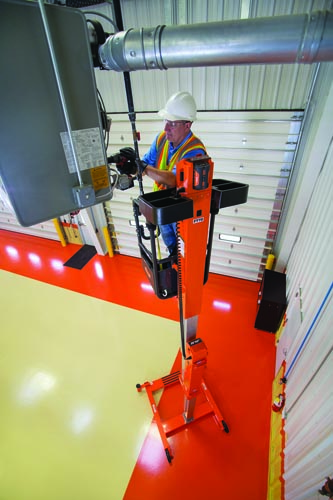Ideal for outdoor construction and industrial applications, Genie® engine-powered articulating Z™ booms provide lifting versatility with a combination of up, out and over positioning capabilities and outreach that’s second to none.
Wearing the right
personal protective equipment (PPE) for the job serves two purposes. It
protects workers, and it helps employers comply with relevant safety
standards and OSHA requirements. But, encouraging workers to wear
PPE—and to wear it properly—isn’t an easy task. Follow the three Cs to
boost proper PPE usage on the job.
Comfortable
The first “C” is
obvious—PPE must be comfortable. When equipment is uncomfortable,
workers are less likely to wear it. Or worse, they may make
modifications that create risks rather than prevent them.
Two important factors
that can affect the comfort level of PPE are fit and material. When PPE
is too loose, too tight or made from scratchy or stiff material, it can
hinder a worker’s movement and productivity.
The best way to determine
whether PPE will be comfortable is to conduct a wear test at your
facility. Try out PPE from several manufacturers and collect feedback
from workers on which manufacturers’ equipment they prefer. If a wear
test isn’t possible, work with a manufacturer who allows you to
customize their equipment. Offer various sizes for workers to choose
from, including sizes specifically for women. And when choosing
materials, look for PPE that is wicking, breathable and lightweight to
regulate air temperature in both hot and cold environments.
Convenient
When PPE is both easy to
access and wear, workers are more likely to comply with your
organization’s PPE requirements. If your facility emphasizes efficiency,
workers may skip time-consuming PPE procedures to meet their daily
quotas and goals.
Store PPE in a convenient
place where workers can access it as part of their daily routine. Don’t
keep safety glasses in one room and gloves in another room several
yards away. Also, specify exactly what PPE is required for certain jobs.
By providing a detailed list of necessary PPE by job, you encourage
workers to wear only the appropriate PPE items, which cuts down on time
spent preparing for the work.
Comprehensive
Sometimes, workers don’t
wear proper PPE because they simply forget what is required for the job
at hand. Fewer PPE items are easier for workers to remember, especially
when extensive PPE is necessary to keep them safe.
Start by identifying all
hazards present on the job site or at the facility where the PPE will be
used. Then, consider PPE that addresses multiple hazards at once, like
industrial safety gloves that are also fire retardant. Technology
advancements have given rise to multipurpose PPE, so consider upgrading
outdated equipment to keep workers as safe as possible.






